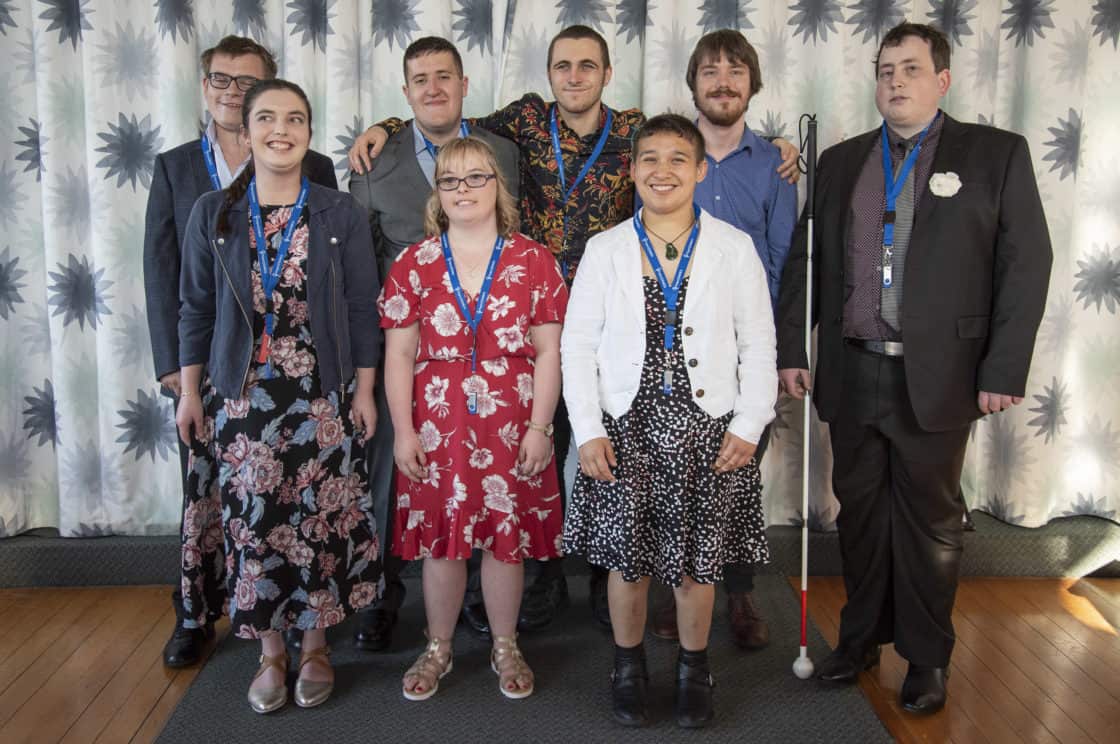Wednesday 4 December 2019Media release4 minutes to read

Our eight graduation interns. Back (left to right): Jason Laurie, Ethan Hamilton-Currey, Finn Lean-Massey, Tor Poulter, Ricky Reeves.
Front (left to right): Emelia Guthrie, Hayley Butler and Deanna Rogers.
The first intake of eight interns with learning disabilities have completed Project SEARCH with Canterbury DHB, graduating from the programme today.
The year-long pilot, hosted at Burwood Hospital, was a first for Australasia when it launched in January giving eight local young people, aged between 18 and 21 years old, the opportunity to learn skills and gain experience in the real world of work.
Designed to break down barriers to employment for young people with disabilities, the programme sees each intern work across three 10-week placements in areas including IT, administration, kitchen and food services, orderly services, in the physiotherapy, spinal and older persons mental health departments, or in maintenance and stores.
Today’s graduation ceremony saw the interns graduate from the programme with a certificate of completion and a celebration of their individual portfolio of achievements from the year, including a video and photos.
Canterbury DHB Chief People Officer Michael Frampton said the programme is an important initiative that’s part of Canterbury DHB’s efforts to ensure our workplaces are inclusive and that we celebrate diversity.
“Canterbury DHB is committed to creating a workforce that understands and reflects the communities we care for. Of more than 200,000 Kiwis with disabilities who are unemployed – three quarters of them want to be working, but can’t get jobs. Project SEARCH has enabled us to be part of the change we want to see.
“We’ve been able to equip our interns with real, meaningful work experience and they’ve repaid us in spades by nailing their jobs. The grit, determination and work ethic they’ve shown this year has been inspiring for everyone in our organisation.
“You’d be hard pressed to find more motivated, loyal and hard-working young people. We’ve already seen benefits to our organisation, like improving our processes and policies to be more inclusive, and seeing an even stronger sense of community in those areas where the interns are working. The business case for diversity and inclusion is really clear.
“I’m incredibly proud of what our interns, their tutors and mentors have achieved. They’ve learnt a range of skills and they’ve proven not just that they’re employable but that they can succeed as part of teams to make workplaces even better,” says Michael.
Ricky Reeves, one of our graduating interns who was left legally blind after he had a brain tumour removed when he was nine years old, says Project SEARCH has given him hope he can have a career.
“I had been told previously that people won’t hire me because I can’t see, and it’s too hard. Project SEARCH lets me show everyone I can do it, that blind people can actually do the same jobs as non-blind people.
“My first internship was in admin where I did jobs like binding, photocopying, making up information folders and sending out letters. Then I worked in IT doing special projects around testing telephone lines and beepers. I’ve also done quite a few presentations about Project SEARCH to different groups of people,” Ricky says.
However, the journey with Project SEARCH doesn’t end here. The class of 2019 will continue to receive support through the programme over the next twelve months as they prepare for work, and eight new interns will start the programme with the DHB in February next year.
Canterbury DHB Project SEARCH is a collaboration between the IHC Foundation, CCS Disability Action, Low Vision and Blind NZ, Riccarton High School and WorkBridge.
More information about Project SEARCH can be found here.
ENDS
Tags Project SEARCH
Back to Health News

